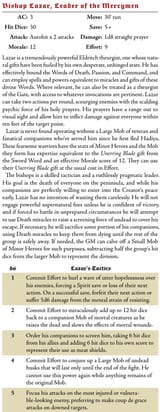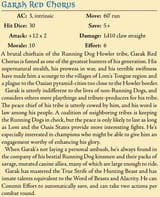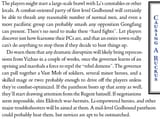Anonymous
8/16/2025, 9:18:01 PM
No.96334337
[Report]
>>96334347
>>96347931
>>96349043
>>96353079
>>96378763
>>96378822
>>96381808
>>96385183
>>96386662
>>96389885
>>96393392
>>96405673
>>96411707
>>96414394
>>96474134
Godbound: A game with very high demands of GM and group cohesion
Godbound is an RPG I have played and GMed since launch, in 2016. I have played and GMed it a lot. It is one of the games I have played the most, and also the one game I have had the least overall success with, as much as I like it (though not its mechanics).
It seems to be the perfect storm of an RPG wherein everyone at the table is near-guaranteed to have a nigh-irreconcilable vision of what the game is about. I have never, ever seen this in any other tabletop system. From what I see, it is far harder to have a cohesive group in campaign in Godbound than in most other RPGs.
Great freedom, grand scale, demigod PCs: a recipe for different people wanting vastly different things.
At least with, say, a grid-based tactics game, everyone has a roughly similar vision of what they are signing up for. Indeed, grid-based tactics RPGs are where I have found the most success. Besides them, I have had reasonable success with PbtA and cousin-of-PbtA games, because of their greater focus.
I do not like Exalted as a system or a setting anywhere as much, but it has plenty more built-in expectations of what the PCs will actually be doing together.
Godbound stresses, time and time again, that it is for sandboxes. The word "sandbox" appears 25 times in the 243-page core rulebook. This is the most salient passage:
>This is crucial because most Godbound campaigns are sandbox campaigns. The GM has built a setting with a great many conflicts, villains, heroes, sympathetic bystanders, long-standing afflictions, and fabulous rewards to be seized. They've brewed up a starting session to thrust the pantheon into a crisis situation to help you all warm up to the game and the setting. Beyond that, however, the game's progress is your responsibility. Your goals and your choices are going to be the things driving the game, and while the world will doubtless react to your decisions and have its own share of ambitious actors, the heart of the game is about the new world your hero is making.
It seems to be the perfect storm of an RPG wherein everyone at the table is near-guaranteed to have a nigh-irreconcilable vision of what the game is about. I have never, ever seen this in any other tabletop system. From what I see, it is far harder to have a cohesive group in campaign in Godbound than in most other RPGs.
Great freedom, grand scale, demigod PCs: a recipe for different people wanting vastly different things.
At least with, say, a grid-based tactics game, everyone has a roughly similar vision of what they are signing up for. Indeed, grid-based tactics RPGs are where I have found the most success. Besides them, I have had reasonable success with PbtA and cousin-of-PbtA games, because of their greater focus.
I do not like Exalted as a system or a setting anywhere as much, but it has plenty more built-in expectations of what the PCs will actually be doing together.
Godbound stresses, time and time again, that it is for sandboxes. The word "sandbox" appears 25 times in the 243-page core rulebook. This is the most salient passage:
>This is crucial because most Godbound campaigns are sandbox campaigns. The GM has built a setting with a great many conflicts, villains, heroes, sympathetic bystanders, long-standing afflictions, and fabulous rewards to be seized. They've brewed up a starting session to thrust the pantheon into a crisis situation to help you all warm up to the game and the setting. Beyond that, however, the game's progress is your responsibility. Your goals and your choices are going to be the things driving the game, and while the world will doubtless react to your decisions and have its own share of ambitious actors, the heart of the game is about the new world your hero is making.

































